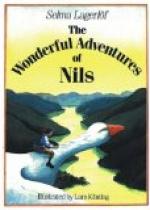Monday, April eleventh.
On the afternoon of Easter Monday, the wild geese and Thumbietot were on the wing. They travelled over Gottland.
The large island lay smooth and even beneath them. The ground was checked just as it was in Skane and there were many churches and farms. But there was this difference, however, that there were more leafy meadows between the fields here, and then the farms were not built up with small houses. And there were no large manors with ancient tower-ornamented castles.
The wild geese had taken the route over Gottland on account of Thumbietot. He had been altogether unlike himself for two days, and hadn’t spoken a cheerful word. This was because he had thought of nothing but that city which had appeared to him in such a strange way. He had never seen anything so magnificent and royal, and he could not be reconciled with himself for having failed to save it. Usually he was not chicken-hearted, but now he actually grieved for the beautiful buildings and the stately people.
Both Akka and the goosey-gander tried to convince Thumbietot that he had been the victim of a dream, or an hallucination, but the boy wouldn’t listen to anything of that sort. He was so positive that he had really seen what he had seen, that no one could move him from this conviction. He went about so disconsolate that his travelling companions became uneasy for him.
Just as the boy was the most depressed, old Kaksi came back to the flock. She had been blown toward Gottland, and had been compelled to travel over the whole island before she had learned through some crows that her comrades were on Little Karl’s Island. When Kaksi found out what was wrong with Thumbietot, she said impulsively:
“If Thumbietot is grieving over an old city, we’ll soon be able to comfort him. Just come along, and I’ll take you to a place that I saw yesterday! You will not need to be distressed very long.”
Thereupon the geese had taken farewell of the sheep, and were on their way to the place which Kaksi wished to show Thumbietot. As blue as he was, he couldn’t keep from looking at the land over which he travelled, as usual.
He thought it looked as though the whole island had in the beginning been just such a high, steep cliff as Karl’s Island—though much bigger of course. But afterward, it had in some way been flattened out. Someone had taken a big rolling-pin and rolled over it, as if it had been a lump of dough. Not that the island had become altogether flat and even, like a bread-cake, for it wasn’t like that. While they had travelled along the coast, he had seen white lime walls with grottoes and crags, in several directions; but in most of the places they were levelled, and sank inconspicuously down toward the sea.
In Gottland they had a pleasant and peaceful holiday afternoon. It turned out to be mild spring weather; the trees had large buds; spring blossoms dressed the ground in the leafy meadows; the poplars’ long, thin pendants swayed; and in the little gardens, which one finds around every cottage, the gooseberry bushes were green.




